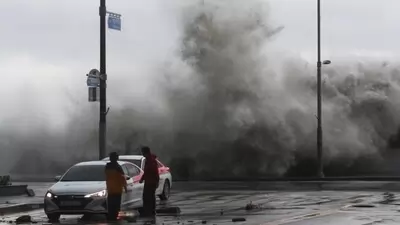South Korea’s SEOUL After a tropical storm passed over South Korea on Friday, flights, trains, and power were mostly restored. At the time, the country was preparing for a pop concert for 40,000 Scouts whose global Jamboree had been cancelled due to the weather.
Khanun primarily affected the southern and eastern parts of the nation, as some cities and towns had 30 to 40 centimetres (12 to 16 inches) of rain. Roads were closed, dozens of homes and structures were damaged, and at least one fatality was reported.
By the time Khanun made landfall in the heavily populated Seoul metropolitan region Thursday night, it had already begun to lose strength, and it blew into North Korea early Friday as a tropical depression.
As the World Scout Jamboree came to an end on Friday, South Korean officials cancelled the country’s storm notice and focused many of their administrative efforts on staging a K-pop concert at a soccer stadium in Seoul.
Before Khanun ordered a large relocation of the Scouts to hotels, government and business training facilities, and university dorms in the greater Seoul area and surrounding areas, the event had been hosted at a beachfront encampment.
In Seoul, where rain was still falling this morning, there have been no reports of significant storm damage. Workers in the nearby port city of Incheon responded to crumbled walls and flooded dwellings.
Emergency personnel in the seashore cities of Gangneung and Sokcho in Gangwon Province, a mountainous area on the east coast that experienced some of Khanun’s worst rain, wade across rivers of brown, thigh-high water covering what had once been roadways.
According to the Ministry of the Interior and Safety, about 16,000 people—mostly in the south—were compelled to flee the storm, but as of Friday, about 9,700 had made it back home.
At least 64 roads were damaged or destroyed by the storm, and about 50 residences and businesses also suffered damage. The majority of the 46,484 residences who lost electricity had power restored, according to the government.
There were no cancellations of commercial aircraft scheduled for Friday despite authorities continuing to impose access restrictions on almost 700 highways.
The storm’s devastation was not immediately reported by North Korea’s state media. State media has previously discussed national initiatives to improve the oversight of roads, railways, bridges, and coastlines as well as to implement safeguards for industry equipment and crops.














